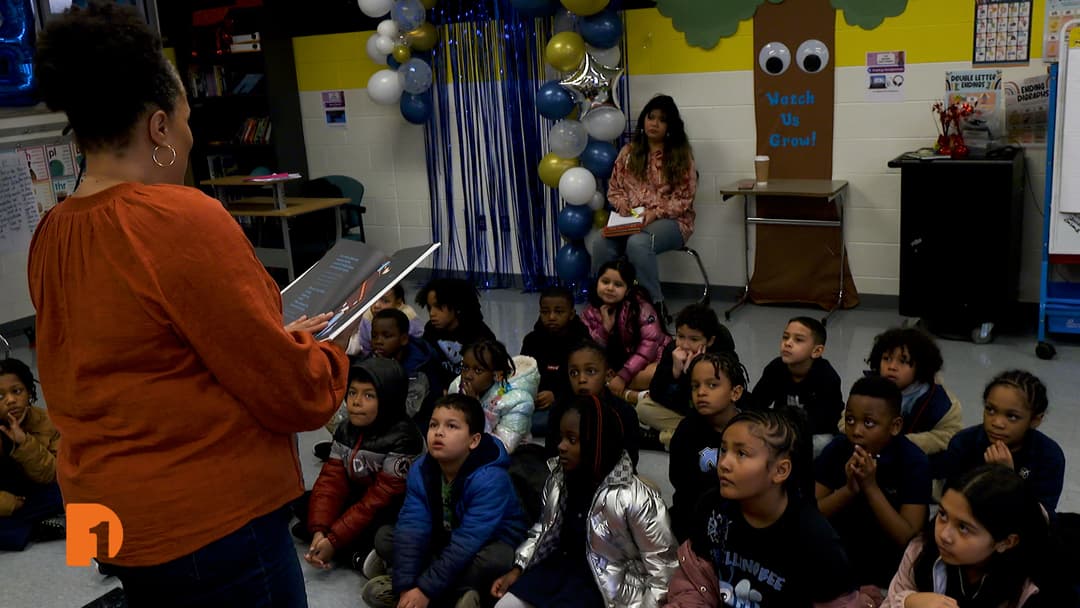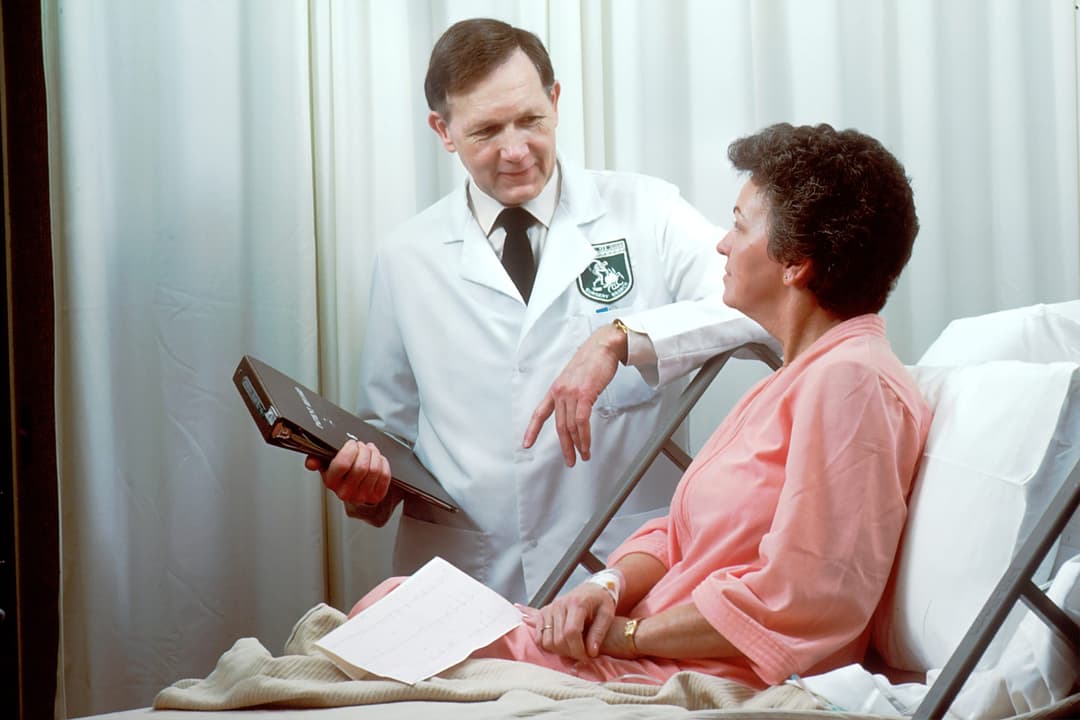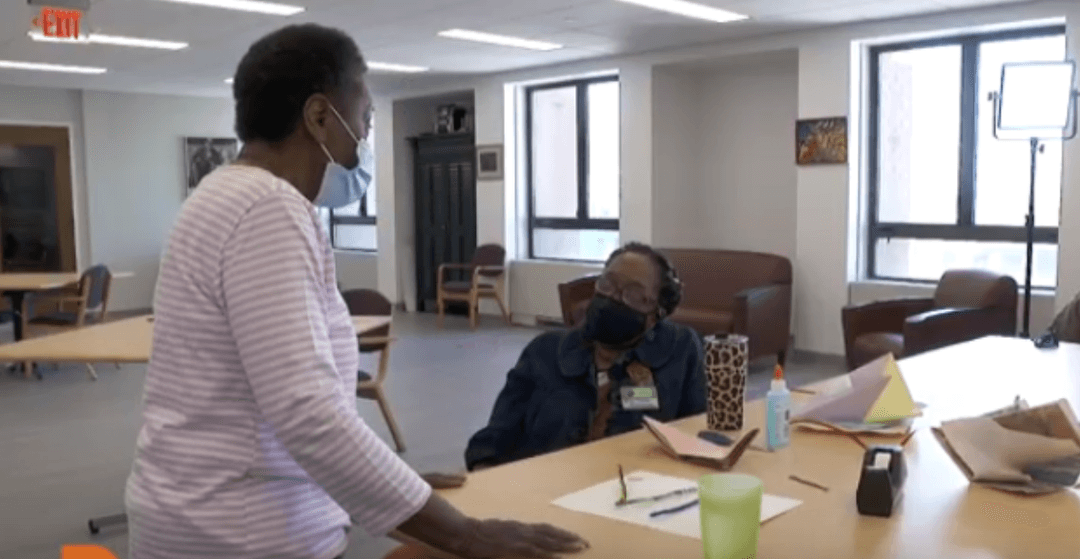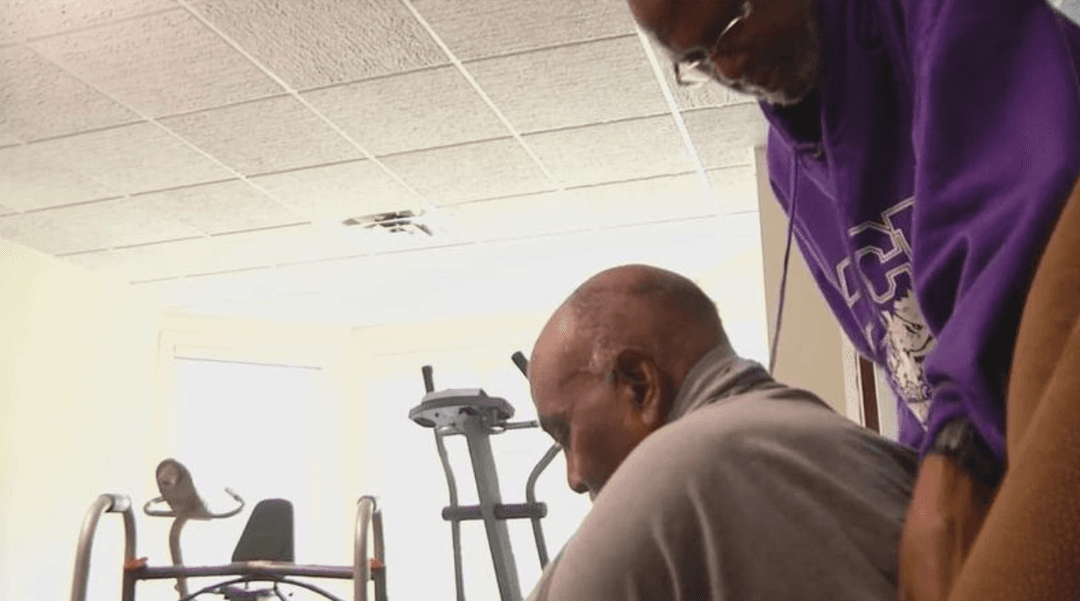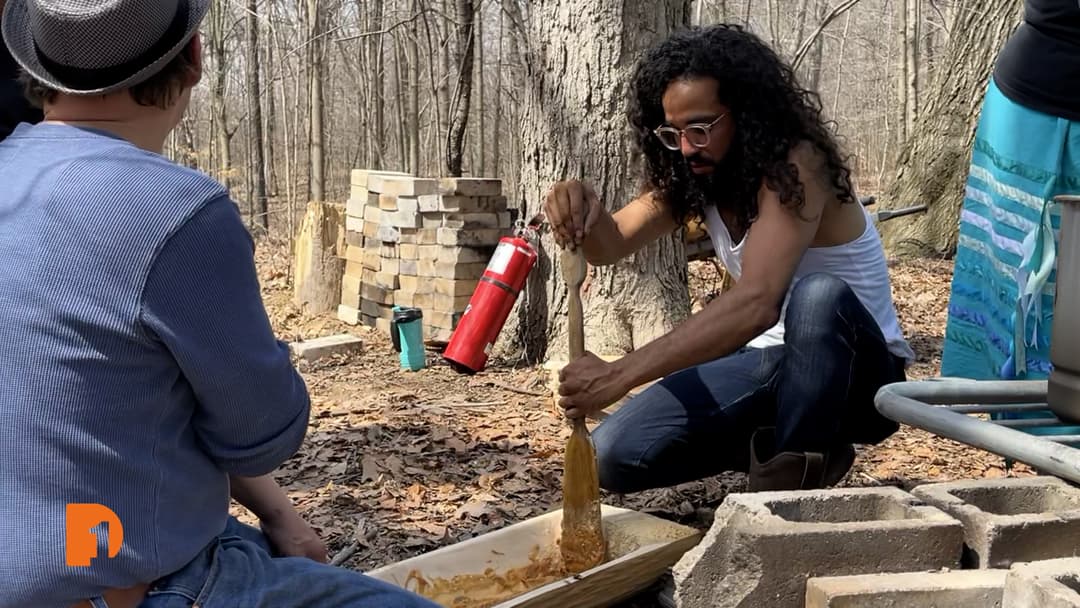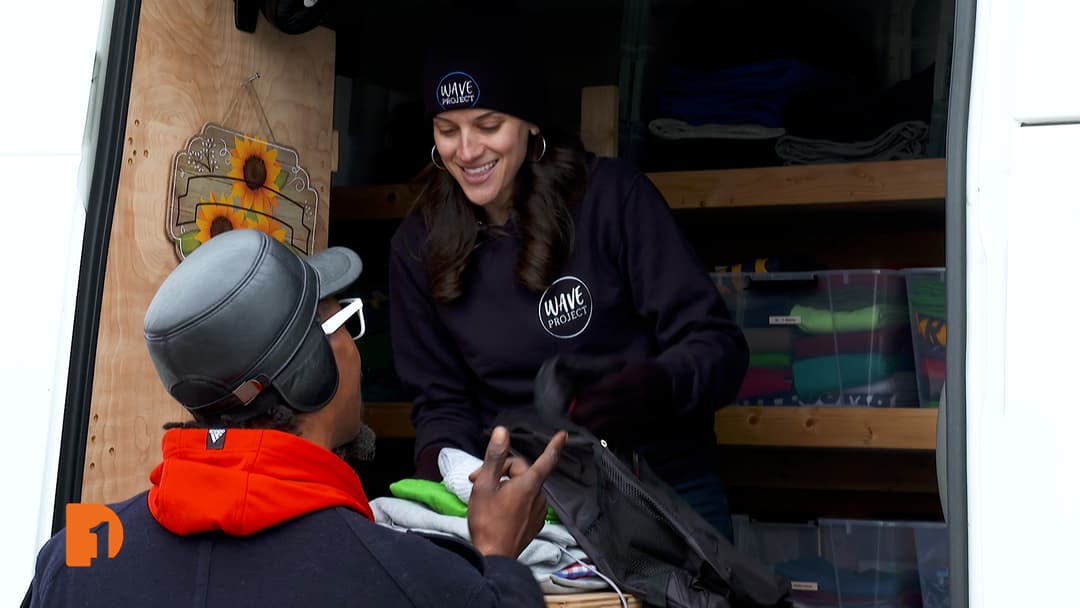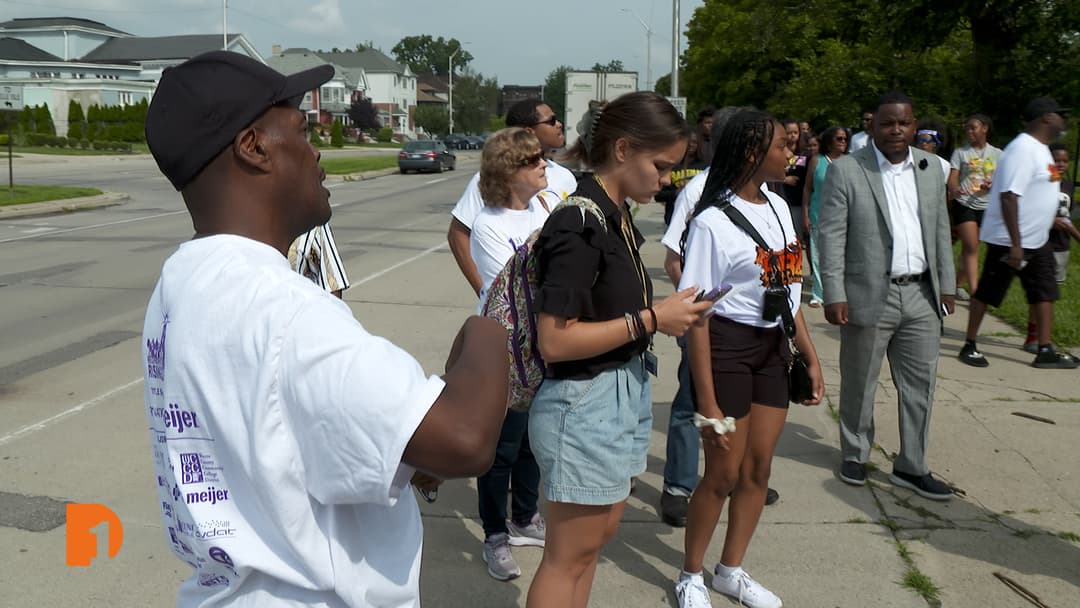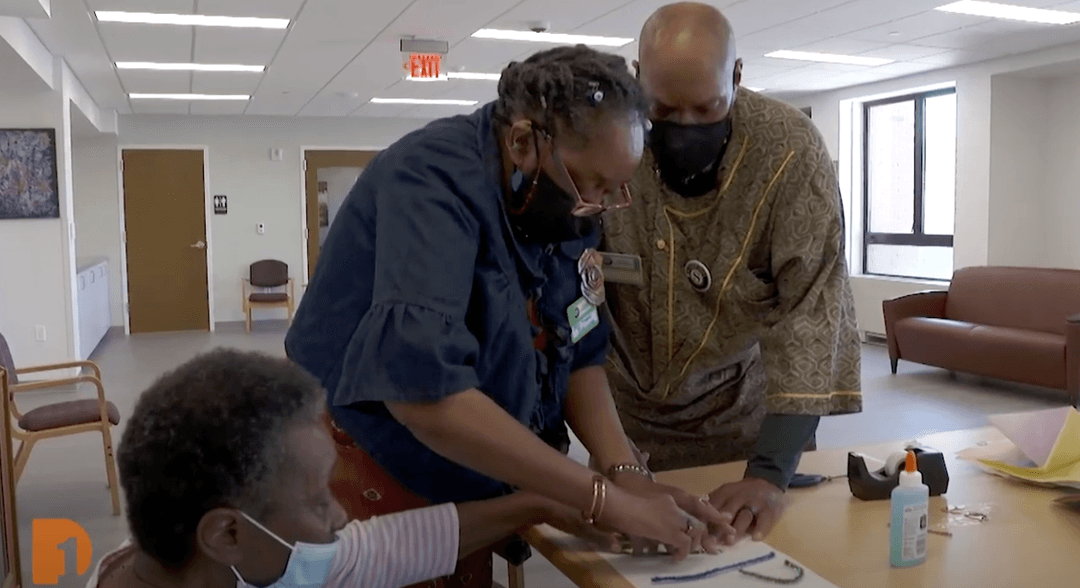
Bridge Michigan | As Pandemic Wanes, Michigan Confronts Toll of Isolation on Homebound Seniors
Apr 12, 2022
Caption: In Ann Arbor, University of Michigan senior Lizzy Rueppel and assisted living facility resident Bobbie Jean Gill have become close friends. They met through a program that pairs college students with Michigan homebound seniors. | Bridge photo by Ted Roelofs
By Ted Roelofs, Bridge Michigan
ANN ARBOR — A year ago, they were strangers.
But in the lobby of an Ann Arbor assisted living home this month, 78-year Bobbie Jean Gill and University of Michigan senior Lizzy Rueppel met with a warm hug that revealed they’ve become fast friends.
“It’s hard to explain, but it’s a special bond. Getting to know Lizzy has lighted my life,” Gill told Bridge Michigan.
Related: Report: More than 8,000 COVID deaths in Michigan were in long-term care
Rueppel added: “At this point, Bobbie Jean is more like a second grandmother to me.”
Nurtured over months of weekly meetings, first on Zoom, then in Gill’s apartment, in phone calls and text messages, their relationship blossomed through a University of Michigan volunteer program that has matched more than 60 assisted living residents with about 100 U-M students. Since its launch in 2020, it has spread to Michigan State University, the University of Wisconsin and Drexel University in Philadelphia.
And though she lives alone in her assisted living facility, Gill is fortunate to have something many of Michigan’s 1.8 million residents ages 65 and older do not ─ a vital sense of human connection.
It’s a bond fractured over the past two years by the COVID-19 pandemic, as an estimated 40,000 nursing home residents were isolated for a year without the touch of a loved one after the state barred outside visitors to nursing homes in March 2020. That resulted in painful scenes repeated at nursing homes across the state, as relatives of residents stood outside waving or holding signs.
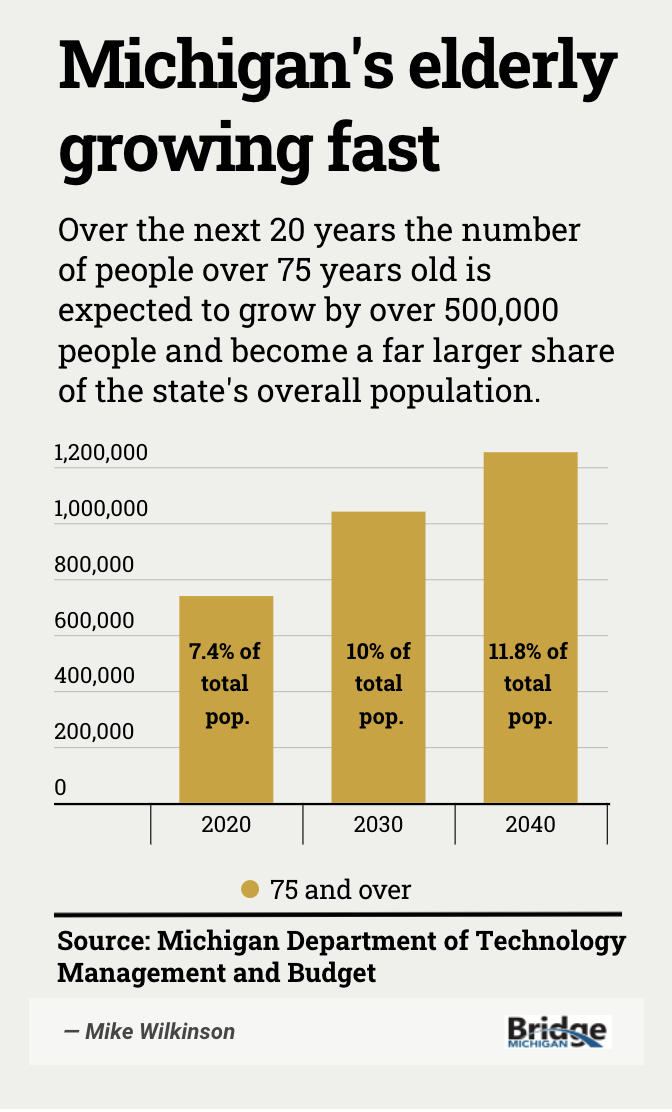 As coronavirus cases fade in Michigan, agencies are renewing efforts to reach out to the state’s homebound seniors, using everything from animatronic pets to home visits, to isolation made worse over the past two years by the pandemic.
As coronavirus cases fade in Michigan, agencies are renewing efforts to reach out to the state’s homebound seniors, using everything from animatronic pets to home visits, to isolation made worse over the past two years by the pandemic.
The closing for months of 350 Michigan senior centers for in-person activities left thousands more residents without a critical social hub, while for many of the 50,000 Michigan homebound seniors who receive home-delivered meals that visit remains their only human contact of the day.
One Michigan expert on aging said the health and emotional costs of isolation and loneliness among the seniors, already considerable before the pandemic, is a growing worry.
“I often think of this as a vital sign,” said Maureen Mickus, a gerontologist at Western Michigan University.
“If I go to the doctor’s office, they are going to check my height and my weight and other vital signs. We know so much about the effect of loneliness that we should be checking that as well.”
She said the impact of social isolation and loneliness among those over 70 is profound: They are tied to greater risks for a litany of physical and mental conditions that include high blood pressure, heart disease, obesity, a weakened immune system, anxiety, depression, cognitive decline, Alzheimer’s disease and even death.
RELATED: Michigan has an obesity problem. That could make COVID even worse
RELATED: Report: More than 8,000 COVID deaths in Michigan were in long-term care
In most of the world, living with extended family is the most common type of household among older people, according to a 2020 Pew Research Center study. But in the United States, with its splintered families, older people are far less likely to live this way – and more likely to live alone.
Pew estimates 27 percent of U.S. adults ages 60 and over now live alone, which would equate to about more than 400,000 in Michigan. Forecasts say the number of U.S. households of those ages 80 and over living alone will more than double from 2018 to 2038.
While many have healthy social connections, a national survey by the University of Michigan found that 56 percent of those ages 50 through 80 felt isolated from others in March 2020 through June 2020, as the pandemic forced a statewide shelter-in-place order. That was double the percentage in the same age range who reported feelings of isolation before the pandemic.
People who find themselves alone due to the death of a spouse, separation from friends or family and lack of transportation are at particular risk.
Clare Luz, a gerontologist at Michigan State University, said the need to build bridges to these isolated seniors has never been more critical.
“It’s heartbreaking, really,” Luz told Bridge. “Because they are isolated they are invisible, out of sight, out of mind. It’s certainly worse because of COVID.”
Limits to technology
As the pandemic left more people isolated in Michigan, state and local officials scrambled to substitute virtual connections like Zoom to replace face-to-face contacts no longer possible during the pandemic shutdowns.
That has its limits for those with hearing loss, who balk at technology or lack reliable broadband. A shortage of high-speed digital access remains a critical issue in rural Michigan, which also leads the state in its percentage of older residents.
“We can’t just rely on technology because it doesn’t work on everybody,” said Scott Wamsley, who directs the Bureau of Aging, Community Living, and Supports for Michigan’s Department of Health and Human Services.
“We certainly know the importance of socialization to older adults.”
Nonetheless, Wamsley pointed to a variety of measures, some virtual, others in-person, aimed at bridging connections for isolated seniors:
Michigan’s state health department operates the Friendly Reassurance program, which provides telephone or in-person contact with at-risk Michigan homebound seniors to assure their safety. The $150,000 program is funded by federal, state and local agencies.
For the year ending September 2021, according to the state, it reached more than 6,500 clients with more than 74,000 telephone or in-person contacts.
A virtual online learning community called GetSetUp that is customized for older adults and taught by older adults in small groups. Michigan partnered with the San Francisco-based interactive learning platform in October 2020, attracting more than 120,000 participants in 500 Michigan communities as of December for classes such as “Declutter to Free Space in Your Home” and “New Year’s Fitness Countdown: Strength Training.”
Congregate meal programs ─ that before the pandemic served meals inside churches, schools and senior centers across the state ─ adapted by offering curbside pickup meal service during the pandemic. In fiscal year 2021, these programs fed nearly 29,000 participants more than 1.4 million meals, funded by $12.2 million in federal, state and local funds.
A statewide program to distribute animatronic pets ─ responsive robotic cats and dogs ─ that were sent at a cost of about $313,000 to nearly 3,000 residents in 162 nursing homes and 55 homes for the aged, with a focus on residents living with cognitive decline. Additional animatronic pets were distributed to isolated older residents through Michigan’s 16 Area Agencies on Aging.
And while these robotic pets might seem strange companions, numerous studies say they can ease feelings of isolation and anxiety among older adults.
Silly but helpful
Sitting in the living room of her home in Newaygo County’s rural Sherman Township, 50 miles north of Grand Rapids, Mary Parkison confessed she was skeptical at first when told she could get one of these pets.
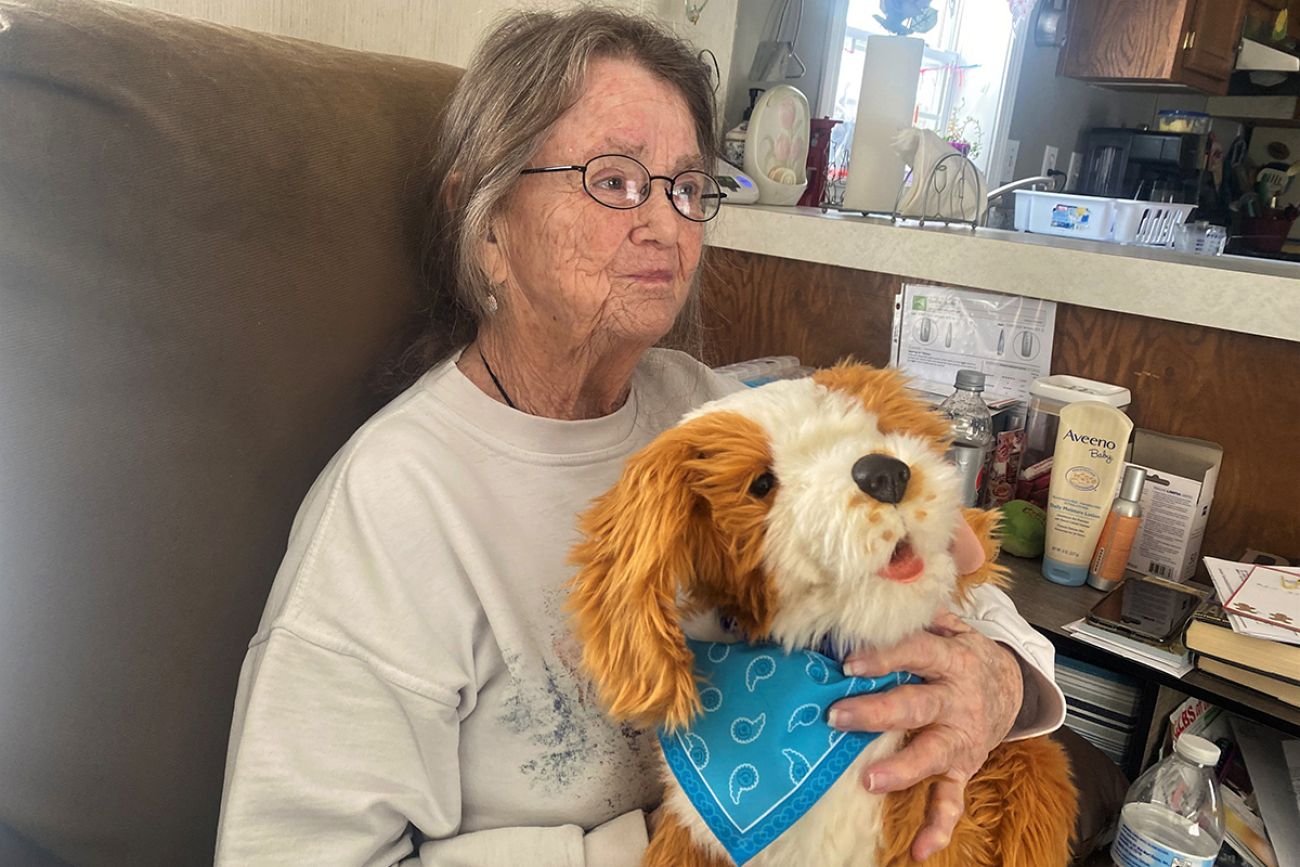
“I thought it was kind of silly,” she said, looking over at the furry brown-and-white animatronic dog that a grandson of hers named Rover. Parkison, who lives alone, got it about a year ago, courtesy of the Area Agency on Aging of Western Michigan.
With sensors at the back of its head, Rover turns its head and barks at a touch, and barks and wags its tail at detected motion.
“If I put him by the window, he’ll bark at the birds,” Parkison, 81, told a visitor.
After a rough couple years in which Parkison endured bypass heart surgery, another operation to remove part of her colon and then a broken hip from a fall, Rover has become a comforting presence in her life.
“I talk to him. I tell him good morning and I ask him how he is. If I don’t feel good, I tell him that, and it feels good to talk to him,” she said.
Home-delivered meals, funded by $42.2 million in federal, state and local sources , delivered meals across the state to 50,055 Michigan homebound seniors in fiscal 2021, most of them low-income or living below the poverty level.
In Grand Rapids, Pam Goudzwaard, 70, has come to her door over much of the past four years for meals delivered through Meals on Wheels of Western Michigan, a nonprofit that serves elderly residents in Kent and Allegan counties. The agency delivered more than 600,000 meals to 3,217 clients in fiscal 2021, with 32 percent of those saying their delivery driver is the only person they see each week.
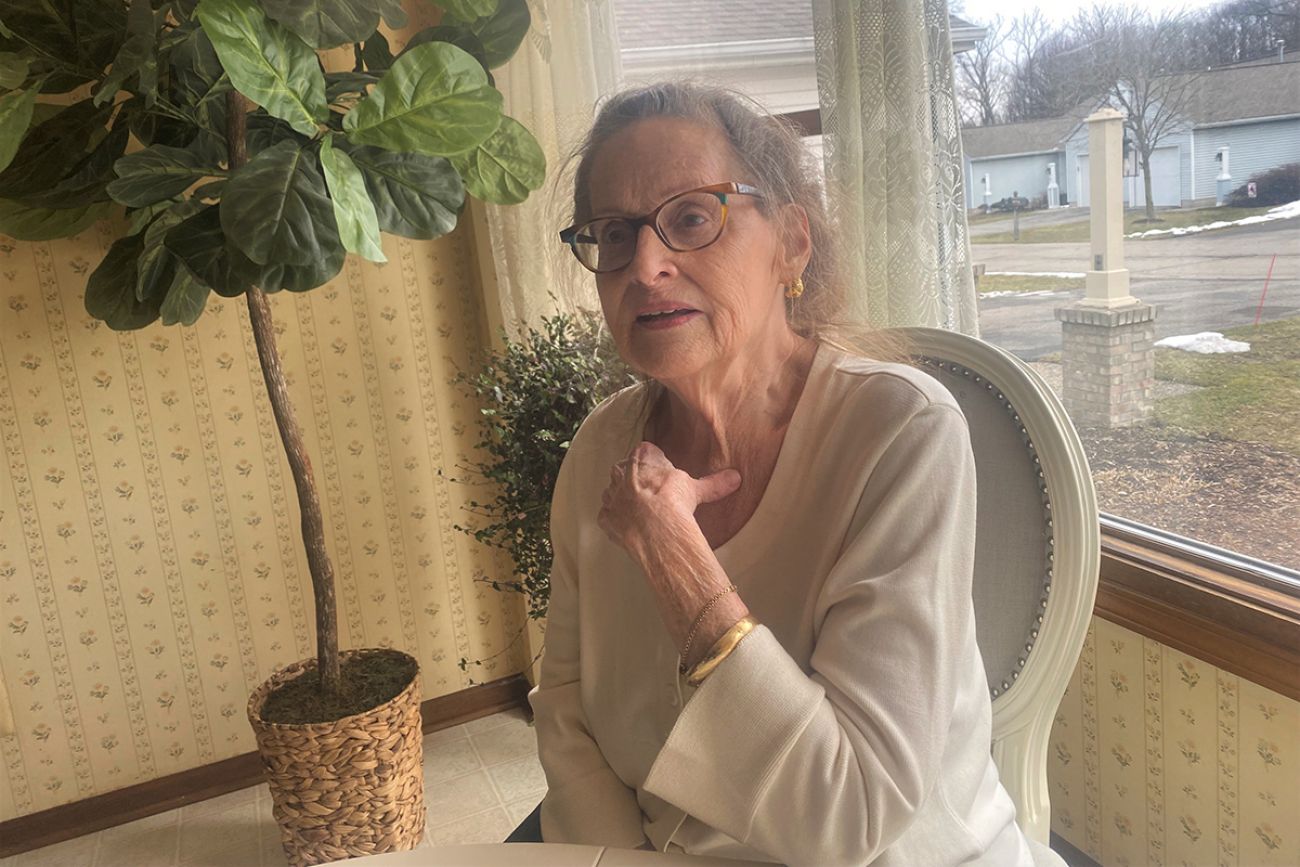
Goudzwaard, who lives alone, turned to the agency after a series of health setbacks, including surgery to remove a cancerous lung, hospitalization for pneumonia and a fall that left her with a broken shoulder.
About 10 months ago, Goudzwaard found herself inexplicably fatigued and disoriented, unsure of the cause.
“I just remember I was very tired. Things got a little fuzzy,” she told Bridge.
Mike Talsma, a delivery driver for the agency, came to her door one day in May ─ but Goudzwaard failed to open it, as she had always done before. He heard the sound of moaning inside.
When she finally did come to the door, Talsma recalled: “She didn’t know who I was. She was not in her right mind.”
Talsma phoned the agency headquarters, and an ambulance was summoned to her address. She was later diagnosed with COVID-19 at a local hospital, where Goudzwaard said she spent more than a week.
“He saved my life. I have no doubt about that,” Goudzwaard said of Talsma, recalling the episode a few minutes before Talsma dropped off his regular meal delivery to Goudzwaard on Monday.
More than a meal
There are other west Michigan cases among the isolated seniors like that of Goudzwaard, as concerns observed by agency delivery drivers or social workers in initial home assessments led to 14 emergency assistance calls for clients in fiscal 2021.
These connections also resulted in a dozen referrals for potential abuse, neglect and exploitation to the state’s Adult Protective Services agency and nearly 1,500 referrals for services like counseling, housing or legal assistance and transportation.
“We deliver much more than a meal. It’s these human connections that are so important,” said Melissa Soberanes of Meals on Wheels of Western Michigan.
Back in Ann Arbor, 2020 U-M graduate Emily Lerner told Bridge she conceived of the idea of matching students with the older residents during years of volunteer work at an assisted living home.
“While I found there to be a lot of concerns with senior care, the No. 1 issue I saw was the lack of connection for residents. I thought there had to be a better way.”
The result: Perfect Pair, a nonprofit that matches volunteer college students with older residents in assisted living homes who want to form a relationship with a different generation. They are paired based on mutual hobbies and special interests.
“We have one match where both speak Spanish as a second language, both love theater and both are avid readers. That’s just one example,” Lerner said.
U-M student Rueppel, 22, said she and assisted living resident Gill soon found they have plenty in common as they met, first on Zoom sessions because of the pandemic and then in weekly in-person meetings where Gill lives about two miles west of the university.
“We both come from large families,” Rueppel said, as the pair sat at a conference room table at Gill’s assisted living facility. “We are both extroverted. We both like artwork.”
Beyond their meetings, the pair keeps in touch via phone calls and text messages, as Gill often reaches out to keep tabs on Rueppel’s college life, or to let her know what’s new in hers.
“I text her all the time, ask her how she did on a test, that sort of thing,” Gill explained. “I know that she’s busy, but she calls me right back or texts me right back.”
But Rueppel said it’s a relationship where the benefits cut both ways, as she recalled a typical text from Gill.
“I flew down to Florida for spring break, and right when I landed, I got a text from her saying, ‘Are you safe in Florida? Did you make it? How are you doing?’”
She looked over at her friend, more than 50 years her senior. “It feels so heartwarming to have someone looking out for me.”
This story was produced through the New York & Michigan Solutions Journalism Collaborative, a partnership of news organizations and universities dedicated to rigorous and compelling reporting about successful responses to social problems. The group is supported by the Solutions Journalism Network.
[et_pb_image src=”https://wordpress.detroitpbs.org/wp-content/uploads/2021/03/Caregivers-TV-01-1-scaled-e1616769491603.jpg” title_text=”Caregivers TV-01 (1)” _builder_version=”4.17.0″ _module_preset=”default” global_colors_info=”{}”]
Stay Connected:
Subscribe to One Detroit’s YouTube Channel & Don’t miss One Detroit Mondays and Thursdays at 7:30 p.m. on Detroit PBS, WTVS-Channel 56.
Catch the daily conversations on our website, Facebook, Twitter @DPTVOneDetroit, and Instagram @One.Detroit
View Past Episodes >
Watch One Detroit every Monday and Thursday at 7:30 p.m. ET on Detroit Public TV on Detroit Public TV, WTVS-Channel 56.
Stay Connected
Subscribe to One Detroit’s YouTube Channel.
Catch the daily conversations on our website, Facebook, Twitter, and Instagram @detroitperforms
Related Posts
Leave a Reply
Your email address will not be published. Required fields are marked*

